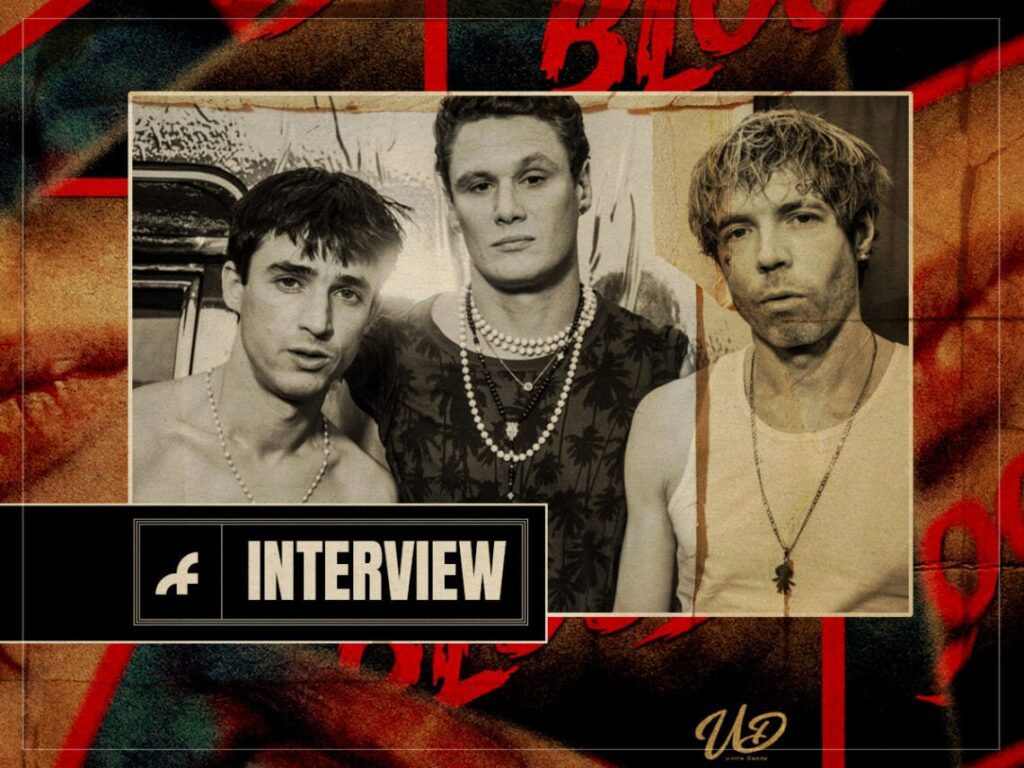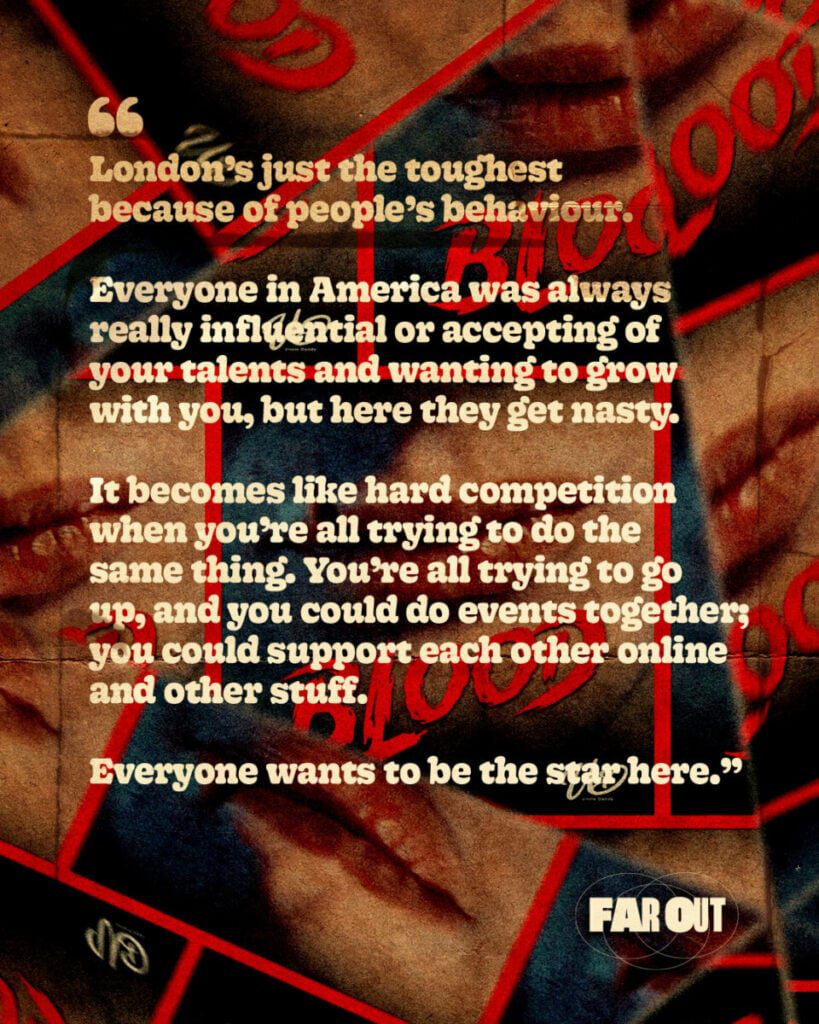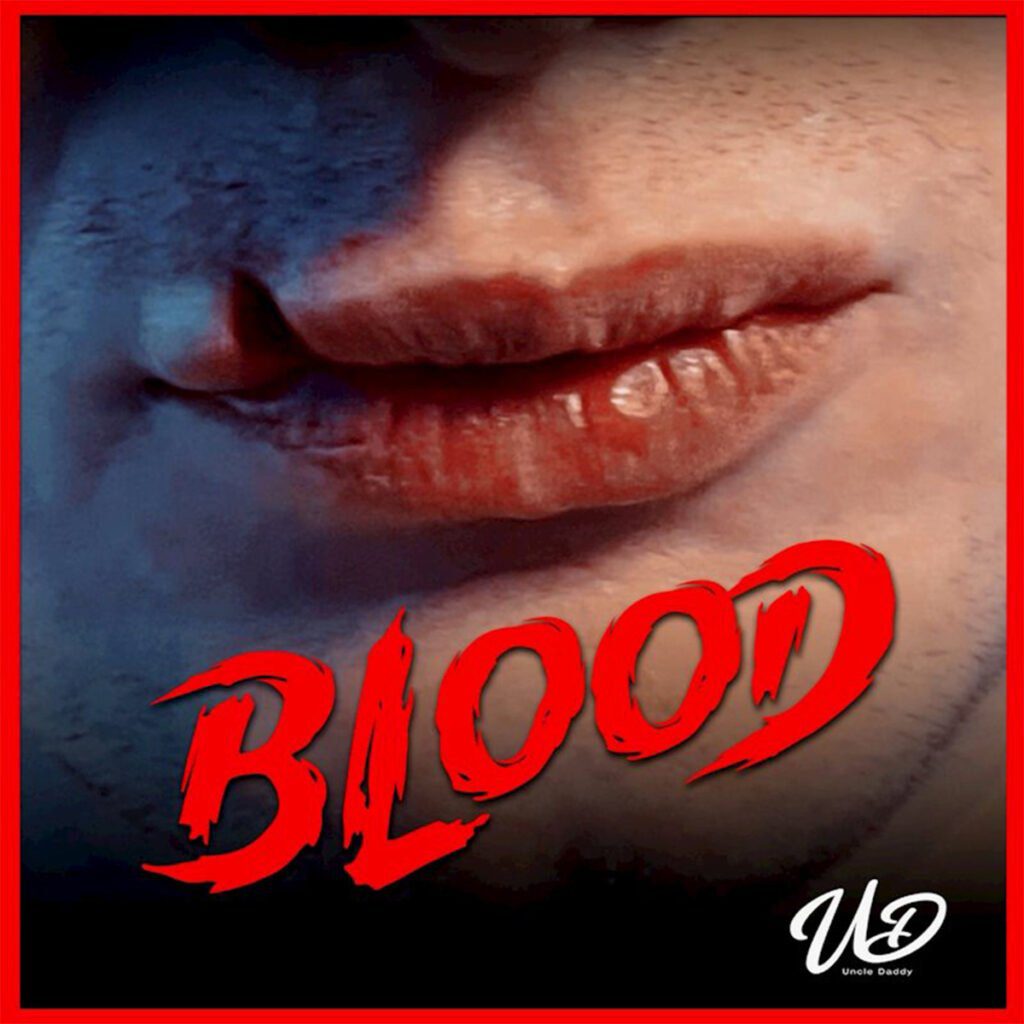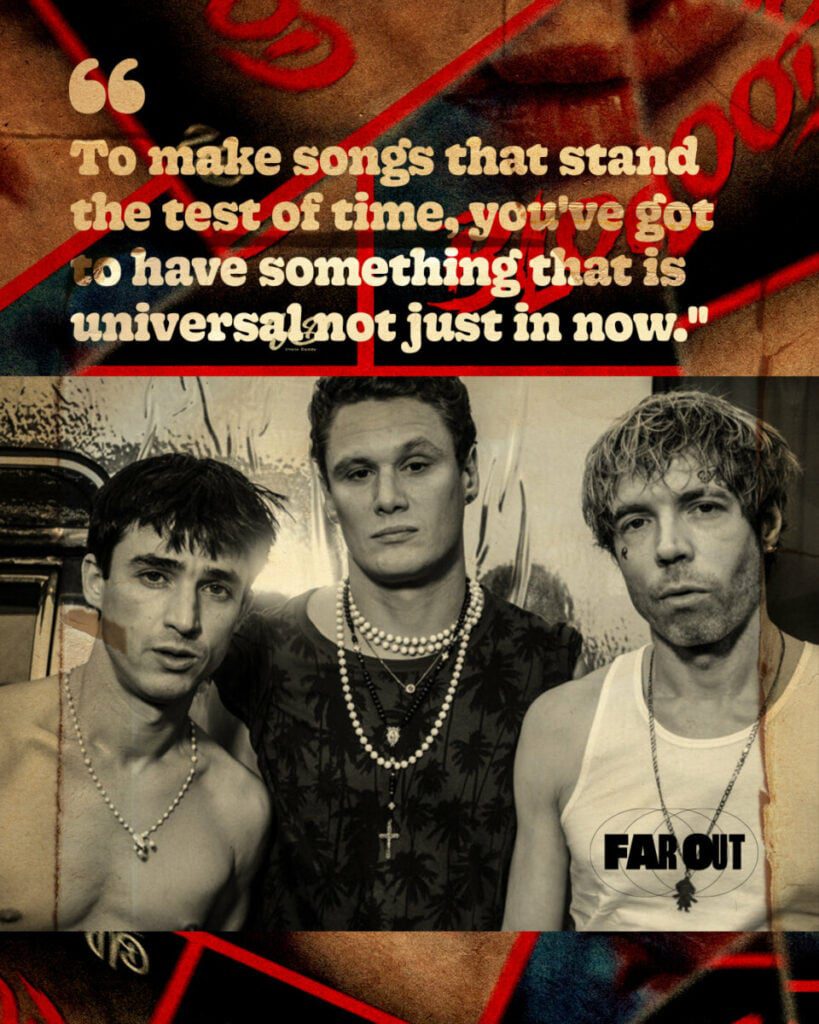Uncle Daddy are on a mission: “London’s just the toughest, because of people’s behaviour”
 Posted On
Posted On
(Credits: Far Out / Uncle Daddy)
Uncle Daddy, the new project from Fat White Family core member Nathan Saoudi, their former bassist Joseph Pancucci and electronic whizz Richard Wilson are on a mission. Aiming to hit back against what they see as a cultural malaise in British music, they released their atmospheric debut track ‘Blood’ in October and are promising much more than just songs.
I chatted with Saoudi and Wilson over Zoom. They’d just played a showcase for their newly launched label, Dash the Henge, at 75 Dean Street, Soho – the ex-Warner Bros screening house – where they offered a taste of the new material. But why Soho and not south London, where two-thirds of the band had cut their teeth? They want to move away from an area they feel is “saturated” with acts replicas of one another. Saoudi thinks that the scene has been “co-opted” by the more serious mainstream labels, meaning groups aren’t doing it the authentic way it used to be. They’re all expecting a deal without putting in the effort. “It’s a bit odd having kids playing in pubs and talking about deals; something’s gone on there,” he states.
Scotsman Wilson maintains that the London scene hasn’t changed in decades and contends that the UK has been stuck in an impasse since Oasis. Before then, according to him, the country was leading musical innovations on the global stage, but things have now changed. He asserts that local London bands simply aren’t doing it properly anymore; they don’t write songs together, don’t look like they’re in the same group, and just turn up and play, expecting the world. He’s gathered this from recent experiences.
“Generally, people want to be in a band, but they don’t know how to write songs or entertain properly. They want to be in a band, so they meet friends or make friends with people to make a band, but they’re not necessarily wanting to write songs or have an idea or goal. The goal is just to be in a band,” he comments.
Saoudi adds: “The discipline’s definitely lacking.”
Wilson, who has had an extensive career, made his name as the electronic artist Beatwife before changing the name to Rognvald, the Nordic spelling of his father’s name. He also had stints working in America and took formative inspiration from cutting-edge Rephlex Records legends such as Aphex Twin and Squarepusher. He contends that the innovators of yesteryear had a goal, a message, and things they wanted to achieve. These days, people are skipping the hard work and are “trying to do it backwards”.
Characterising this skewed contemporary approach, Saoudi laughs: “Have the vibe, then figure out a goal,” he laughs.
It seems to the pair that music, particularly that centred in London, is brimming with people for the wrong reasons. Wilson comments that they’re trying to work against this and offer insight into their broader motivations but also have fun with what they’re doing. They have a goal, but they’re not taking themselves too seriously. Saoudi, stubbing a cigarette out, says, “Take the music seriously, but not yourselves.”
Naturally, the heady, electronic vibe of ‘Blood’ and their other songs is different from the experimental rock of Fat White Family. Uncle Daddy is a merger of Wilson’s world of electronic music and IDM and the realm of more traditional songwriting from which Saoudi hails. He wanted to explore more electronic sounds in Fat White Family and has finally found a way to scratch the itch:
“That’s the world I come from,” he tells me. “And I was getting fed up with it because there’s this other world that never got tapped into.”
Wilson maintains that while much of his previous work was concentrated heavily on sound design without words, it still had a message, and he was still trying to write other songs outside of it. Only after he moved to Los Angeles and started working commercially in trap and hip-hop did he become interested in how to write songs correctly. Now, he has all the knowledge and gear and seeks to make material that can “stand in time”. Despite putting himself down, Saoudi claims he has a vast library of original bangers.

Of course, a discussion of this new project would be complete without touching on the name. As you might have guessed, it’s a subversive choice that appears to be a meme-like joking phrase, prompting consternation from people. Yet, when people ask Saoudi, “What’s an Uncle Daddy?” he tells them, “It’s a band”. He also asserts that it’s meant to be a bit of a joke and states that if people have a problem with the name and the words prompt dark thoughts, that’s their problem: “You’re doing something wrong in your head.”
Outlining the point, Wilson points to the fact that under his old alias, Beatwife, it was hard to get commercial work in the West, but he had no issues in Asia. He even worked with Casio out there. “Uncle Daddy is more innocent than Beatwife. Beatwife was married to the beat, but no one would get it. Everyone goes to violence, but in Asia, Casio would sign contracts with me with Beatwife written on it,” he states. “My experience is that you need a controversial name to keep people talking.”
Expressing their stimuli, Saoudi reaffirms his belief in a nationwide “musical impasse”. No one can break it, he claims. He continues that artists are worried that the ones who eventually do will be loved more than them, forcing them to adapt to new methods. It’s stifling progress. “There isn’t very much development, and there can be,” he says on a more positive note.
Much of it is pastiche sonics with topical lyrics, which means that in 20 years, the songs will not resonate with listeners. “To make songs that stand the test of time, you’ve got to have something that is universal not just in now,” Saoudi adds, mentioning that in America, South America and Asia, musical innovations abound, but “not in the UK, which is apparently a leading exporter of music.”
Why is this? Saoudi’s reasoning is stark. “Bitterness and jealousy. That’s what I’ve seen in this country,” he says in a reflex-like manner. Uncle Daddy are refusing to give in to this.
They are looking to undo London’s endemic, bitter competition in favour of something much more positive. Comparing his extensive and successful time in the US with London, Wilson explains: “London’s just the toughest because of people’s behaviour. Everyone in America was always really influential or accepting of your talents and wanting to grow with you, but here they get nasty.”
He continues: “It becomes like hard competition when you’re all trying to do the same thing. You’re all trying to go up, and you could do events together; you could support each other online and other stuff.”

Saoudi adds: “Everyone wants to be the star here.”
They believe this outlook is also impeding progress, meaning that in addition to starting their new outfit, they’ve launched Dash the Henge, a tie-in with Saoudi’s Camberwell record shop and creative hub of the same name. The Fat White’s member says the only judgement he will pass is on whether music is good and if those playing it are serious about their craft.
Outling the label’s egalitarian approach, Wilson continues: “If there’s a band that we like or artists, we would go as far as helping them produce their whole album. Let’s step you up to the level you need to be.” They want to offer education and plug the gaps of what major labels don’t do.
At one point, when discussing the malaise of the British music industry, the topic turned to drugs. Wilson says seriously, “For me, there shouldn’t be people on stage, on drugs, singing songs to people, telling them how they should be.” He believes it offers a seriously skewed perception to younger fans who feel like they need to be fucked up to be in a successful band. “A lot of the indie bands are on heroin,” he adds.
Saoudi also offers his perspective: “It’s too rife. A tiny, tiny minority is just not on anything. It’s just not really about the music, it’s about the party, all that shit.”
Given the topic of our conversation, this naturally felt like the right time to ask about ex-Fat Whites member Saul Adamczewski, who left while making this year’s fourth album, Forgiveness Is Yours. Fans have noted that his physical appearance has taken a severe tumble, with whispers about personal issues and a few spats on social media adding to the speculation. Saoudi says: “He’s gone absolutely bonkers. I was trying to help him for four months. He’s like on the meth, smack, Valium, every single fucking thing. He looks so bad, man.” Wilson says this case typifies his above point.
“He’s really pissed me off. He’s pissed us all off. I was desperately trying to fix it, he’s completely traumatised my brother,” Saoudi continues, before making a revelation about the band’s status. “I’m saying to him, ‘You’ve gotta own up to that’, and he’s just gone off on one; he said it’s all our faults, and I’ve had to leave because of how fucked this situation is. So my brother’s just stuck there with these hanger on’s, and I’m just sat there like, ‘Oh my god’.”
He concludes: “All these people, these drugs, you see Saul, you see that? That’s way worse than what happened in the 1960s, ’70s, ’80s. Syd Barrett, he had a bit of fucking meat on him.”
We can only hope Uncle Daddy delivers on the positive promise they’re offering for music. All the signs are there.
[embedded content]
Related Topics



